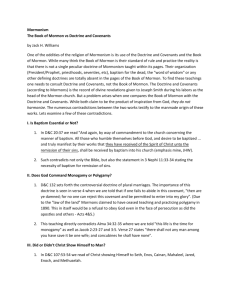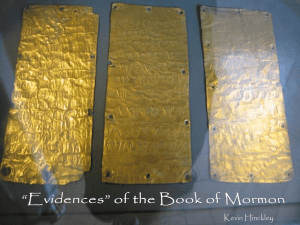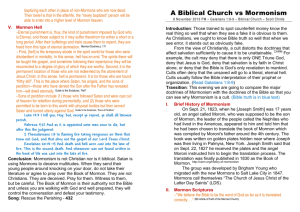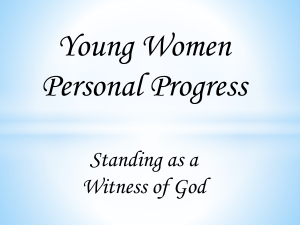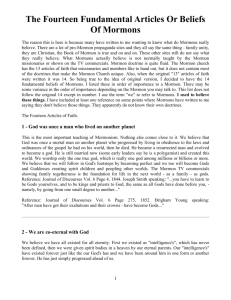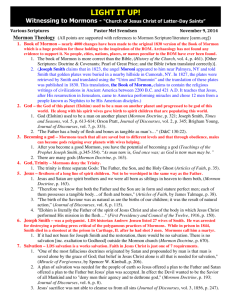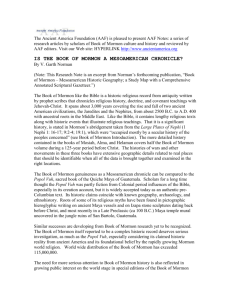Is Mormonism Christian?
advertisement
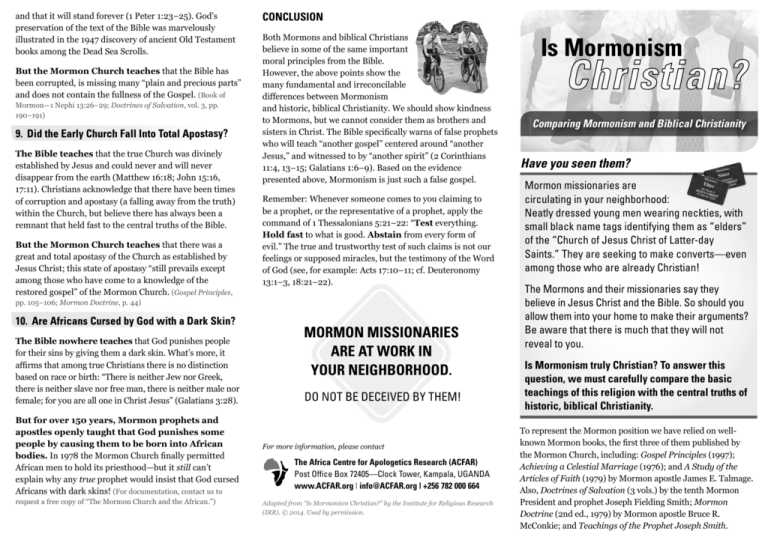
and that it will stand forever (1 Peter 1:23–25). God’s preservation of the text of the Bible was marvelously illustrated in the 1947 discovery of ancient Old Testament books among the Dead Sea Scrolls. But the Mormon Church teaches that the Bible has been corrupted, is missing many “plain and precious parts” and does not contain the fullness of the Gospel. (Book of Mormon—1 Nephi 13:26–29; Doctrines of Salvation, vol. 3, pp. 190–191) 9. Did the Early Church Fall Into Total Apostasy? The Bible teaches that the true Church was divinely established by Jesus and could never and will never disappear from the earth (Matthew 16:18; John 15:16, 17:11). Christians acknowledge that there have been times of corruption and apostasy (a falling away from the truth) within the Church, but believe there has always been a remnant that held fast to the central truths of the Bible. But the Mormon Church teaches that there was a great and total apostasy of the Church as established by Jesus Christ; this state of apostasy “still prevails except among those who have come to a knowledge of the restored gospel” of the Mormon Church. (Gospel Principles, CONCLUSION Both Mormons and biblical Christians believe in some of the same important moral principles from the Bible. However, the above points show the many fundamental and irreconcilable differences between Mormonism and historic, biblical Christianity. We should show kindness to Mormons, but we cannot consider them as brothers and sisters in Christ. The Bible specifically warns of false prophets who will teach “another gospel” centered around “another Jesus,” and witnessed to by “another spirit” (2 Corinthians 11:4, 13–15; Galatians 1:6–9). Based on the evidence presented above, Mormonism is just such a false gospel. Remember: Whenever someone comes to you claiming to be a prophet, or the representative of a prophet, apply the command of 1 Thessalonians 5:21–22: “Test everything. Hold fast to what is good. Abstain from every form of evil.” The true and trustworthy test of such claims is not our feelings or supposed miracles, but the testimony of the Word of God (see, for example: Acts 17:10–11; cf. Deuteronomy 13:1–3, 18:21–22). pp. 105–106; Mormon Doctrine, p. 44) 10. Are Africans Cursed by God with a Dark Skin? The Bible nowhere teaches that God punishes people for their sins by giving them a dark skin. What’s more, it affirms that among true Christians there is no distinction based on race or birth: “There is neither Jew nor Greek, there is neither slave nor free man, there is neither male nor female; for you are all one in Christ Jesus” (Galatians 3:28). But for over 150 years, Mormon prophets and apostles openly taught that God punishes some people by causing them to be born into African bodies. In 1978 the Mormon Church finally permitted African men to hold its priesthood—but it still can’t explain why any true prophet would insist that God cursed Africans with dark skins! (For documentation, contact us to request a free copy of “The Mormon Church and the African.”) MORMON MISSIONARIES ARE AT WORK IN YOUR NEIGHBORHOOD. DO NOT BE DECEIVED BY THEM! For more information, please contact The Africa Centre for Apologetics Research (ACFAR) Post Office Box 72405—Clock Tower, Kampala, UGANDA www.ACFAR.org | info@ACFAR.org | +256 782 000 664 Adapted from “Is Mormonism Christian?” by the Institute for Religious Research (IRR). © 2014. Used by permission. Is Mormonism Christian? Comparing Mormonism and Biblical Christianity Have you seen them? Mormon missionaries are circulating in your neighborhood: Neatly dressed young men wearing neckties, with small black name tags identifying them as “elders” of the “Church of Jesus Christ of Latter-day Saints.” They are seeking to make converts—even among those who are already Christian! The Mormons and their missionaries say they believe in Jesus Christ and the Bible. So should you allow them into your home to make their arguments? Be aware that there is much that they will not reveal to you. Is Mormonism truly Christian? To answer this question, we must carefully compare the basic teachings of this religion with the central truths of historic, biblical Christianity. To represent the Mormon position we have relied on wellknown Mormon books, the first three of them published by the Mormon Church, including: Gospel Principles (1997); Achieving a Celestial Marriage (1976); and A Study of the Articles of Faith (1979) by Mormon apostle James E. Talmage. Also, Doctrines of Salvation (3 vols.) by the tenth Mormon President and prophet Joseph Fielding Smith; Mormon Doctrine (2nd ed., 1979) by Mormon apostle Bruce R. McConkie; and Teachings of the Prophet Joseph Smith. 1. Is There More Than One True God? The Bible teaches that there is only one True and Living God, and apart from Him there are no other gods (Deuteronomy 6:4; Isaiah 43:10,11; 44:6,8; 45:21,22; 46:9; Mark 12:29–34). But the Mormon Church teaches that Jesus Christ is our elder brother who progressed to godhood, having first been created by sexual union as a spirit child by Heavenly Father and a heavenly mother. Jesus was later conceived physically through intercourse between Heavenly Father and the virgin Mary. Mormon doctrine affirms that Jesus, all angels, Lucifer, all demons, and all human beings are originally spirit brothers and sisters. (Doctrine and Covenants 93:21; Journal of But the Mormon Church teaches that there are many Gods, and that we ourselves can become gods and goddesses in the celestial kingdom. It also teaches that those who achieve godhood will have spirit children who will worship and pray to them, just as we worship and pray to God the Father. (Book of Abraham 4:3ff; Doctrine and Covenants 132:19–20; Discourses, vol. 1, pp. 50–51; Gospel Principles, pp. 11–13; Achieving a Celestial Marriage, p. 129; Mormon Doctrine, pp. 546–547; 742; Ezra Taft Benson, Come Unto Christ, p. 4; Robert L. Millet, The Mormon Faith: Understanding Restored Christianity, p. 31; Abraham 3:22–27; Moses 4:1–2; Gospel Principles, pp. 17–18; Mormon Doctrine, p. 192) Gospel Principles, p. 245; Achieving a Celestial Marriage, p. 130; Gospel Principles, p. 302) 4. Is God a Trinity? 2. Was God Once a Man Like Us? The Bible teaches that Father, Son, and Holy Spirit or Holy Ghost are not separate Gods or separate beings, but are distinct Persons within the one Triune Godhead. Throughout the New Testament the Son and the Holy Spirit, as well as the Father are separately identified as and act as God (Son: Mark 2:5–12; John 20:28; Philippians 2:10–11; Holy Spirit: Acts 5:3,4; 2 Corinthians 3:17–18, 13:14); yet at the same time, the Bible teaches that these three are only one God (see point 1). The Bible teaches that God is Spirit (John 4:24; 1 Timothy 6:15–16). He is not a man (Numbers 23:19; Hosea 11:9; Romans 1:22–23). He has always (eternally) existed as God—all-powerful, all knowing, and everywhere present (Psalm 90:2, 139:7–10; Isaiah 40:28; Luke 1:37). But the Mormon Church teaches that God the Father was once a man like us who progressed to become a God and has a body of flesh and bone. Indeed, the Mormon Church teaches that God himself has a father, and a grandfather, and so on to infinity. (“God himself was once as we are now, and is an exalted man, and sits enthroned in yonder heavens!”—Teachings of the Prophet Joseph Smith, pp. 345–347; Doctrine and Covenants 130:22; Gospel Principles, p. 9; Articles of Faith, p. 430; Mormon Doctrine, p. 321; Teachings of the Prophet Joseph Smith, p. 373; Mormon Doctrine, p. 577) 3. Are Jesus and Satan Spirit Brothers? The Bible teaches that Jesus is the unique Son of God; he has always existed as God, and is co-eternal and coequal with the Father (John 1:1, 14; 10:30; 14:9; Colossians 2:9). While never less than God, at the appointed time He laid aside the glory He shared with the Father (John 17:4, 5; Philippians 2:6–11) and was made flesh for our salvation; His incarnation was accomplished through being conceived supernaturally by the Holy Spirit and born of a virgin (Matthew 1:18–23; Luke 1:34–35). But the Mormon Church teaches that Father, Son, and Holy Ghost are three separate Gods, and that the Son and Holy Ghost are the literal offspring of Heavenly Father and a celestial wife. (Teachings of the Prophet Joseph Smith, p. 370; Mormon Doctrine, pp. 576–577; Joseph Fielding McConkie, Encyclopedia of Mormonism, vol. 2, p. 649) 5. Was the Sin of Adam and Eve a Great Evil, or a Great Blessing? The Bible teaches that the disobedience of our first parents Adam and Eve was a great evil. Through their fall sin entered the world, bringing all human beings under condemnation and death. Thus we are born with a sinful nature, and will be judged for the sins we commit as individuals (Ezekiel 18:1– 20; Romans 5:12–21). But the Mormon Church teaches that Adam’s sin was “a necessary step in the plan of life and a great blessing to all of us.” (Gospel Principles, p. 33; Book of Mormon—2 Nephi 2:25; Doctrines of Salvation, vol. 1, pp. 114–115) 6. Can We Make Ourselves Worthy Before God? The Bible teaches that apart from the saving work of Jesus Christ on the cross we are spiritually “dead in trespasses and sins” (Ephesians 2:1,5) and are powerless to save ourselves. By grace alone, apart from self-righteous works, God forgives our sins and makes us worthy to live in His presence (Ephesians 2:8–9; Titus 3:5–6). Our part is only to cling to Christ in heartfelt faith. (However, it is certainly true that without the evidence of changed conduct, a person’s testimony of faith in Christ must be questioned; salvation by grace alone through faith, does not mean we can live as we please—Romans 6:1–4). But the Mormon Church teaches that eternal life in the presence of God (which it terms “exaltation in the celestial kingdom”) must be earned through obedience to all of the Mormon Church’s commands, including those in its secret and exclusive Mormon temple rituals. Works are required for eternal life (entering the “celestial kingdom”). (Gospel Principles, pp. 303–304; Pearl of Great Price—Third Article of Faith; Mormon Doctrine, pp. 339, 671; Book of Mormon—2 Nephi 25:23) 7. Does Christ’s Atoning Death Benefit Those Who Reject Him? The Bible teaches that the purpose of the atoning work of Christ on the cross was to provide the complete solution for humankind’s sin problem. However, those who reject God’s grace in this life will have no part in this salvation but are under the judgment of God for eternity (John 3:36; Hebrews 9:27; 1 John 5:11–12). But the Mormon Church teaches that the purpose of the atonement was to bring resurrection and immortality to all people, regardless of whether they receive Christ by faith. Christ’s atonement is only a partial basis for worthiness and eternal life, which also requires obedience to all the commands of the Mormon church, including exclusive Mormon temple rituals. (Gospel Principles, pp. 74–75; Mormon Doctrine, p. 669) 8. Is the Bible the Unique and Final Word of God? The Bible teaches that it is the unique, final and infallible Word of God (2 Timothy 3:16; Hebrews 1:1–2; 2 Peter 1:21)
